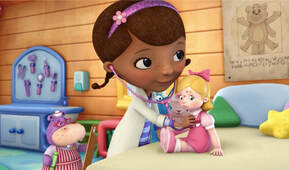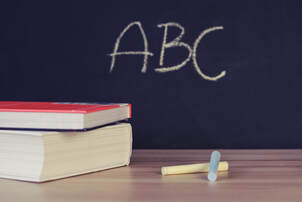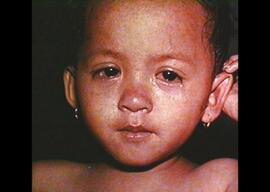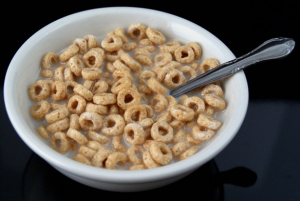Author: Lori S Brizee MS, RDN, LD, CDE |
| Breakfast just doesn’t fit into our busy schedules! Does this sound like you? You’re running late for work or school, and your kids are meandering around the house with one shoe on. They don’t get your need for them to get moving! It’s all you can do to get half bowl of cereal down them before you run out of the door. |
The typical breakfast of a bowl of cereal with milk and maybe a little fruit just doesn’t cut it! We all need more calories, as well as more protein, high fiber carbohydrates and fat to fuel ourselves for the day. Kids who eat a complete meal for breakfast will do better at school in the morning. An elementary aged child needs 400 to 600 calories and at least 10 gm protein. A teenager, depending on size and activity level, will need anywhere from 500-1000 calories and 15-30 gm protein. Eating a relatively high protein and fat breakfast will help your child stay full until lunch time.
1 cup Cheerios with 1/2 cup 2% milk: 160 calories and 7 gm protein is not enough fuel for any child! Add a piece of fruit and 1/2 English muffin with 1 Tbsp peanut butter to bring this up to about 410 calories and 12-13 gm protein.
If you are like most parents, you need some very quick and easy breakfast ideas for those busy mornings! Our goal is to have a whole grain or other high fiber starch, protein, and vegetable and/or fruit. Think outside the box; breakfast doesn’t have to be made from traditional breakfast foods.
Read on to get some good ideas for healthy breakfasts on busy mornings!
1 cup Cheerios with 1/2 cup 2% milk: 160 calories and 7 gm protein is not enough fuel for any child! Add a piece of fruit and 1/2 English muffin with 1 Tbsp peanut butter to bring this up to about 410 calories and 12-13 gm protein.
If you are like most parents, you need some very quick and easy breakfast ideas for those busy mornings! Our goal is to have a whole grain or other high fiber starch, protein, and vegetable and/or fruit. Think outside the box; breakfast doesn’t have to be made from traditional breakfast foods.
Read on to get some good ideas for healthy breakfasts on busy mornings!
"Obesity in Kids"
There is a lot of press about "Childhood Obesity" these days. High body weight for height (or body mass index, BMI) in kids is concerning, since it tends to go along with many chronic health problems. But, focusing on weight tends to backfire; it just stigmatizes kids who live in larger bodies. The problem is those chronic health problems, not the weight per se. Why not focus on healthy lifestyle habits that help prevent those chronic health problems regardless of body weight?
Just talking about a child's weight--telling a child that they are overweight can have unintended consequences! If a kid thinks that their body shape or size is “wrong” or “bad” they think that they are wrong or bad—they feel shame and develop low self esteem. Kids who are ashamed of themselves are at very high risk for depression and anxiety as well as eating disorders—Anorexia, bulimia and binge eating disorder. These problems are far worse than having a high body weight!
If your child's weight is increasing faster than expected, or your doctor has told you that your child is overweight or obese, there are MANY THINGS YOU CAN DO WITHOUT EVER TALKING ABOUT YOUR CHILD'S WEIGHT!!!
Read on for 14 Do's and Don't for dealing with weight concerns in children. These are that can make a difference in anyone's health. They also happen to have an impact on weight gain and growth.
There is a lot of press about "Childhood Obesity" these days. High body weight for height (or body mass index, BMI) in kids is concerning, since it tends to go along with many chronic health problems. But, focusing on weight tends to backfire; it just stigmatizes kids who live in larger bodies. The problem is those chronic health problems, not the weight per se. Why not focus on healthy lifestyle habits that help prevent those chronic health problems regardless of body weight?
Just talking about a child's weight--telling a child that they are overweight can have unintended consequences! If a kid thinks that their body shape or size is “wrong” or “bad” they think that they are wrong or bad—they feel shame and develop low self esteem. Kids who are ashamed of themselves are at very high risk for depression and anxiety as well as eating disorders—Anorexia, bulimia and binge eating disorder. These problems are far worse than having a high body weight!
If your child's weight is increasing faster than expected, or your doctor has told you that your child is overweight or obese, there are MANY THINGS YOU CAN DO WITHOUT EVER TALKING ABOUT YOUR CHILD'S WEIGHT!!!
Read on for 14 Do's and Don't for dealing with weight concerns in children. These are that can make a difference in anyone's health. They also happen to have an impact on weight gain and growth.
by Lori Brizee MS, RDN, CDE
Pediatric Nutrition expert and guest contributor
plements other than vitamin D, and possibly fluoride. If your child is a very picky eater, has multiple food allergies, or has a condition that causes poor nutrient absorption or increased needs for certain nutrients, supplements may be needed—talk with your pediatrician or ask for a referral to a pediatric Registered Dietitian-Nutritionist. A complete multivitamin that includes iron will meet the needs for most of these kiddos.

The start of school is just around the corner for the Bend-Lapine and Redmond school districts (and maybe for you homeschoolers too!). This is the third of 3 blog posts on getting ready to head back to school. You can find part one (about getting back to good school year habits) here and part two (about getting medical and dental needs taken care of) here. Now, we will focus on how to manage once school has actually started. Are you ready for school anxiety and behavior problems? If you need help figuring things out, talk to your child's doctor.

The start of school is just around the corner for the Bend-Lapine and Redmond school districts (and maybe for you homeschoolers too!). I am going to write several blog posts on getting ready to head back to school. This is part 2 of 3. As the summer rolls to an end, it’s a good time to take advantage of having (relatively) more free time to take care of healthcare needs.

The start of school is just around the corner for the Bend-Lapine and Redmond school districts (and maybe for you homeschoolers too!). This is the first of three blog posts on getting ready to head back to school. It’s hard to come back from the free-for-all that is summer break. Families are traveling. School year limits on sleep and screen time and meals go out the window in favor of long days, vacations, and time with friends.
Understanding your insurance policy is vital to coordinating your child’s health care. Your insurance policy is a contract between you and the insurance company. Our payment for services provided is also based on a contract between Erika Beard-Irvine MD LLC and your insurance company. We are obligated to report all services provided and to bill for them in accordance with our fee schedules. Much as it would be a contract violation for you to refuse to pay your insurance premium, it is also a contract violation not to charge or to undercharge for services we provide.

We’ve been hearing a lot about measles in Oregon in the past couple of weeks. There has been a lot of discussion online (and a lot of misinformation). What is it? Is it really that bad? Why is it spreading all of the sudden?
The American Academy of Pediatrics just released a new policy statement recommending against corporal punishment (define as “noninjurious, open-handed hitting with the intention of modifying child behavior”) and nonphysical forms of punishment “that are cruel and degrading and thus incompatible with the convention include, for example, punishment which belittles, humiliates, denigrates, scapegoats, threatens, scares, or ridicules the child.” The statement also includes things like forcing children to hold uncomfortable positions and forced ingestions (like washing a child’s mouth out with soap). What does this mean for parents?
Parents and schools tend to have a strong reaction to finding out a child has head lice. I hear “burn down the house” often given as a recommendation for dealing with lice. Head lice aren’t a health hazard or a sign of dirtiness or poor hygiene. They are, though, one of the most common causes of school absenteeism. Despite not causing any actual medical problems, those little bugs cause a great deal of anxiety among parents and schools. Grab a drink, y’all, because there is a lot to talk about.
About the blog
A look at some topics in breastfeeding, medicine, and kids health.
Archives
December 2019
November 2019
September 2019
August 2019
June 2019
January 2019
November 2018
August 2018
July 2018
June 2018
December 2016
November 2016



 RSS Feed
RSS Feed